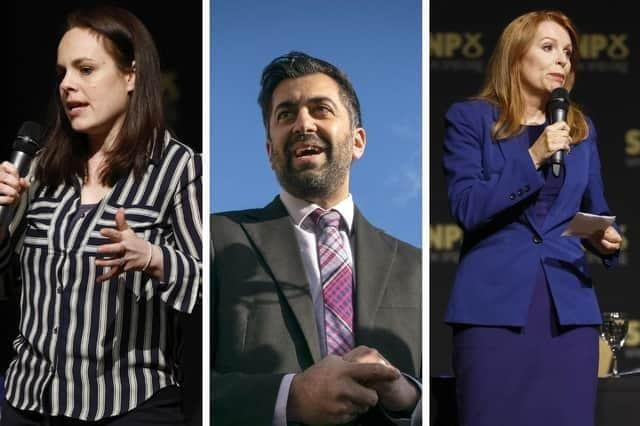SNP leadership contest: Brutal and divisive - the twists and turns of the SNP leadership race
The First Minister could not have known just how tough that love would prove. The six-week race to replace her was bitter, divisive and may well have inflicted lasting damage on the SNP.
There were moments of brutality that surprised — and, let's be honest, delighted —even the most hardened of Holyrood observers. This was politics as blood sport; a bare-knuckle fight for the keys to Bute House. Journalists couldn’t get enough of it.
Advertisement
Hide AdAdvertisement
Hide AdBut it was also an unedifying spectacle for the country. By the end of the contest, Peter Murrell, the SNP's long-serving chief executive and Ms Sturgeon's husband, would be out of a job and the party’s media chief would have resigned.


Health secretary Humza Yousaf, finance secretary Kate Forbes and former community safety minister Ash Regan all had very different visions for the future of the party and the country.
Ms Forbes's campaign got off to a rocky start when a row erupted over her socially conservative religious views. A committed member of the Free Church of Scotland, she told The Scotsman she would not have voted for gay marriage, and seemed genuinely wrong-footed by the backlash.
SNP politicians who had publicly supported her bid changed their minds, and for a few days there was speculation about whether she would even stay in the contest. But Ms Forbes was made of stronger stuff.
The gloves really came off during the first television debate, held by STV on March 7. This saw Ms Forbes launch a scathing attack on the record of her main rival, Mr Yousaf.
“Humza, you’ve had a number of jobs in government,” she said. “You were a transport minister and the trains were never on time, when you were justice secretary the police were stretched to breaking point, and now as health minister we’ve got record-high waiting times. What makes you think you can do a better job as first minister?”
It was an eye-opening performance. Pete Wishart, the SNP’s longest-serving MP, called the debate “thoroughly dispiriting”. Mr Yousaf and other senior party figures accused Ms Forbes of “trashing the SNP’s record”.
Opposition politicians were delighted. Scottish Labour health spokeswoman Jackie Baillie had described Mr Yousaf as “without a doubt the worst minister I have ever had the misfortune of shadowing”.
Advertisement
Hide AdAdvertisement
Hide AdMs Forbes was unrepentant. “Humza made a point last night that we needed to have robust, frank exchanges and I think that’s what we saw last night,” she told journalists during a visit to the Scotch Whisky Experience the next day. “We are in an election contest, not just for the leader of the SNP, but for the first minister of Scotland. The successful candidate will need to engage in far more robust exchanges with the UK Government, with the opposition and I think last night was a test of competence, of grit and determination and of ability to perform under pressure.”
Amid the mud-slinging, there were also concerns about transparency and the integrity of the vote itself. Both Ms Forbes and Ms Regan called for an independent auditor to be brought in to oversee the process. The latter even wanted SNP members to be able to change their minds about who they had voted for.
Behind the scenes, there were dark whispers from figures linked to Ms Regan. Sources raised the possibility of “votes” from dead or elapsed members being used to influence the results. Evidence was not forthcoming.
Ms Regan, the self-confessed outsider in the race, was also responsible for some of the contest’s more surreal moments. During one hustings, she suggested building a “readiness thermometer” to illustrate how prepared Scotland was for independence. “We could put it up in Glasgow or in Edinburgh, and it can be outside and it has a dial on it that moves,” she explained. Alas, it was not to be.
Mr Yousaf committed a gaffe while meeting Ukrainian women in Edinburgh. “Where are all the men?” he joked, appearing to forget many were likely to be engaged in conflict at home as they defend their country in the face of the Russian invasion.
But it was the self-inflicted row over membership numbers that caused the most damage. All three candidates had demanded the party reveal how many people would be entitled to vote in the contest.
The SNP initially rubbished reports that its membership had dropped by 30,000 – with its then head of communications, Murray Foote, dismissing the claims as “drivel” on social media. In an embarrassing U-turn, the party then admitted that as of February 15 this year, its membership was at 72,186 – down from 103,884 in 2021.
Mr Foote quit, insisting he had acted in “good faith” and pointing the finger at SNP headquarters. Mr Murrell, who had served as SNP chief executive for almost 25 years, resigned the following day. "While there was no intent to mislead, I accept that this has been the outcome,” he said in a statement.
Advertisement
Hide AdAdvertisement
Hide AdThe party’s interim chief executive, Mike Russell, admitted the SNP was in “a tremendous mess”. Few would disagree. Ms Sturgeon preferred to call it “growing pains”.
In his victory speech, Mr Yousaf pledged to work to unite the SNP after a “bruising” contest. “Where there are divisions to heal we must do so quickly, because we have a job to do,” he said. “As a party we are at our strongest when we are united, and what unites us is our shared goal of delivering independence for our nation."
He faces a difficult task. Bringing the party together will take political skill and an open, inclusive approach. Who knows, it may even require a bit of tough love. Perhaps he can ask Ms Sturgeon for advice.
Comments
Want to join the conversation? Please or to comment on this article.
